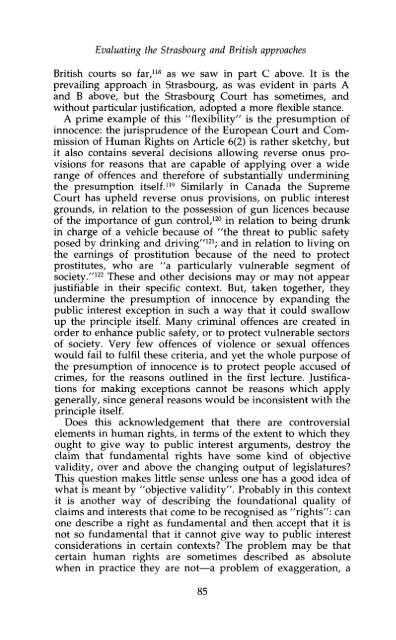Human Rights, Serious Crime and Criminal Procedure - College of ...
Human Rights, Serious Crime and Criminal Procedure - College of ...
Human Rights, Serious Crime and Criminal Procedure - College of ...
- No tags were found...
You also want an ePaper? Increase the reach of your titles
YUMPU automatically turns print PDFs into web optimized ePapers that Google loves.
Evaluating the Strasbourg <strong>and</strong> British approachesBritish courts so far, 118 as we saw in part C above. It is theprevailing approach in Strasbourg, as was evident in parts A<strong>and</strong> B above, but the Strasbourg Court has sometimes, <strong>and</strong>without particular justification, adopted a more flexible stance.A prime example <strong>of</strong> this "flexibility" is the presumption <strong>of</strong>innocence: the jurisprudence <strong>of</strong> the European Court <strong>and</strong> Commission<strong>of</strong> <strong>Human</strong> <strong>Rights</strong> on Article 6(2) is rather sketchy, butit also contains several decisions allowing reverse onus provisionsfor reasons that are capable <strong>of</strong> applying over a widerange <strong>of</strong> <strong>of</strong>fences <strong>and</strong> therefore <strong>of</strong> substantially underminingthe presumption itself. 119 Similarly in Canada the SupremeCourt has upheld reverse onus provisions, on public interestgrounds, in relation to the possession <strong>of</strong> gun licences because<strong>of</strong> the importance <strong>of</strong> gun control, 120 in relation to being drunkin charge <strong>of</strong> a vehicle because <strong>of</strong> "the threat to public safetyposed by drinking <strong>and</strong> driving" 121 ; <strong>and</strong> in relation to living onthe earnings <strong>of</strong> prostitution because <strong>of</strong> the need to protectprostitutes, who are "a particularly vulnerable segment <strong>of</strong>society." 122 These <strong>and</strong> other decisions may or may not appearjustifiable in their specific context. But, taken together, theyundermine the presumption <strong>of</strong> innocence by exp<strong>and</strong>ing thepublic interest exception in such a way that it could swallowup the principle itself. Many criminal <strong>of</strong>fences are created inorder to enhance public safety, or to protect vulnerable sectors<strong>of</strong> society. Very few <strong>of</strong>fences <strong>of</strong> violence or sexual <strong>of</strong>fenceswould fail to fulfil these criteria, <strong>and</strong> yet the whole purpose <strong>of</strong>the presumption <strong>of</strong> innocence is to protect people accused <strong>of</strong>crimes, for the reasons outlined in the first lecture. Justificationsfor making exceptions cannot be reasons which applygenerally, since general reasons would be inconsistent with theprinciple itself.Does this acknowledgement that there are controversialelements in human rights, in terms <strong>of</strong> the extent to which theyought to give way to public interest arguments, destroy theclaim that fundamental rights have some kind <strong>of</strong> objectivevalidity, over <strong>and</strong> above the changing output <strong>of</strong> legislatures?This question makes little sense unless one has a good idea <strong>of</strong>what is meant by "objective validity". Probably in this contextit is another way <strong>of</strong> describing the foundational quality <strong>of</strong>claims <strong>and</strong> interests that come to be recognised as "rights": canone describe a right as fundamental <strong>and</strong> then accept that it isnot so fundamental that it cannot give way to public interestconsiderations in certain contexts? The problem may be thatcertain human rights are sometimes described as absolutewhen in practice they are not—a problem <strong>of</strong> exaggeration, a85
















